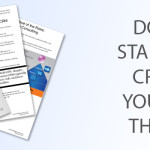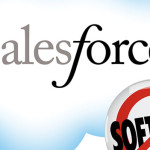Salesforce
now browsing by tag
The Seven Deadly Sins of CRM

This is the second installment of our excerpt series from our White Paper, “The Beginner’s Guide to CRM: An Honest Look at the Pros and Cons.” Go here to download the paper.
CRM systems are powerful tools, but there are some CRM mistakes to avoid.
The following are seven most common CRM mistakes that can send users to “CRM hell:”
CRM Mistake # 1: Failing to commit to learning. High-end CRMs have substantial learning curves, even for technology and data professionals. Further, the curve differs not only from solution to solution, but also from organization to organization.
CRM Mistake # 2: Not doing comprehensive business planning. For many CRMs, implementation is 80 percent business planning, 20 percent technical work. The business planning should take place before the technical work, not during.
CRM Mistake # 3: Improvising the implementation. Most businesses that fail with CRM do so in implementation. Before beginning the process, seek out implementation guides and study them carefully.
CRM Mistake # 4: Over-relying on intuition. Do not assume that you are using your CRM correctly; read the best practices, train the users, and ensure everyone is following the rules.
CRM Mistake # 5: Having under-qualified people in charge. Often, CRM implementation and administration falls on the lap of someone who cannot support it, usually a sales or data-entry person. If an expert is not available, ensure that the project manager is thoroughly well-versed on the CRM best practices.
CRM Mistake # 6: Over-extending the platform. It is important to know the limitations of the platform and not go beyond those. For example, many CRMs are not suitable for project management. Trying to use or modify CRMs can create data and usability problems.
CRM # 7: Being too lax on data-entry processes. Record creation processes must be strictly followed at all times. At first, many teams see the CRM as a laborious data-entry exercise. But if they don’t respect the data entry rules and processes, the whole system can fail.
Still have questions? We’re here to help. Contact us for a risk-free CRM consultation.
Don’t Get Started With CRM Until You’ve Read This

CLICK HERE TO DOWNLOAD THE WHITE PAPER
GeauxPoint is pleased to release its newest white paper, The Beginner’s Guide to CRM: An Honest Look at the Pros and Cons. The CRM guide will help businesses get the most out of their investment, avoid CRM pitfalls, and learn CRM optimization strategies.
This blog post is the first installment of the series on the white paper. The series will go into depth about the topics presented in the document.
Introduction
Customer relationship management (CRM) systems can be either the best or the worst thing to happen to your business. While many sources say that CRMs are quickly becoming must-have business tools, not everyone will experience an easy adoption.
This guide will help sales managers and business owners to fully understand, evaluate, and get started with CRM. It will explain what CRM does, evaluate CRM platforms, and provide a series of tools to help the reader decide if CRM is a good fit for them. Ultimately, the reader will gain a healthy understanding of CRM pros and cons, and will be able to make an informed decision of how to proceed.
So, should you set up a CRM right now? Although you may get the impression that CRM adoption is inevitable, it’s better to wait until you can commit the time and resources to a successful implementation.
However, once you are ready, a successful CRM launch can lead to breakthrough results for your business. This, of course, depends on your ability to implement and administer the system in accordance with best practices.
Have a question about CRM? We’re friendly — get in touch with us today!
Five Industries Where Salesforce® is BOOMING

By now, Salesforce is a big deal in most industries, and the ones that are lagging behind are quickly catching up. The following five industries are seeing lightening-fast adoption of Salesforce and the gains that come with it:
Salesforce for Biotechnology
“It’s not okay to keep your customers at arms length. You’ve got to be engaged with them at every step of the way,” said New England Biotlab CIO and head of IT, Ken Grady, in an interview with Salesforce.com
In an industry that grew 10.8 percent from 2009-2014 to $289 billion, business leaders are clambering to form closer relationships to prospects and customers. With such high growth potential and high incidences of success, effective sales-pipeline management can catapult growth.
GeauxPoint says: Biotechnology is certainly an industry ripe for Salesforce adoption, and we expect the demand for CRM to increase from this industry.
Salesforce for Higher Education
Colleges and universities are elevating their fundraising, recruiting, and admission efforts to new heights through Salesforce. Their large and complex alumni and donor-management strategies benefit greatly through advanced relationship management.
Some popular draws to Salesforce from higher education institutions include:
- Campaign management,
- Real-time analytics
- Web portals
- Team collaboration
- Mobile access,
- The ability to build custom applications without having to code
GeauxPoint says: Many of the principles we coach non-profits on are being used to great effect in higher education.
Salesforce for Financial Planners and Wealth Managers
Although initially Salesforce faced a lukewarm reception from some financial planners, many have since seen the light.
Effective use of CRMs like Salesforce are becoming essential components for competition in the financial planning world. The company that can provide the perfect number of touches in the most efficient and accurate manner possible are winning larger and larger market shares.
GeauxPoint says: It’s an exciting time to be in the financial planning world. The financial businesses we’ve served have been our most enthusiastic and grateful clients.
Salesforce for Associations
The way people use associations is changing, and many such organizations are modifying the way they bring value to their clients. One thing is certain for associations: closer member relationships are essential. Through Salesforce, associations are increasing member retention, growing their constituencies, and creating stronger relationships with existing members.
GeauxPoint says: CRMs are especially critical for associations who are trending to the negative. For associations who are worried about their long-term health or that are doing better than ever, Salesforce is a powerful growth engine.
Salesforce for Non-Profits
Thanks to the Salesforce Foundation, non-profits can license the platform at an affordable rate. This helps them step up their fundraising games drastically. Also, since Salesforce doesn’t require much in the way of upfront tech investments, even small non-profits can use the system to great effect.
GeauxPoint says: Advancing worthy causes by promoting innovative technology is a core value of GeauxPoint and we’ve witnessed their success first hand.
Schedule a risk-free Salesforce Consultation today.
